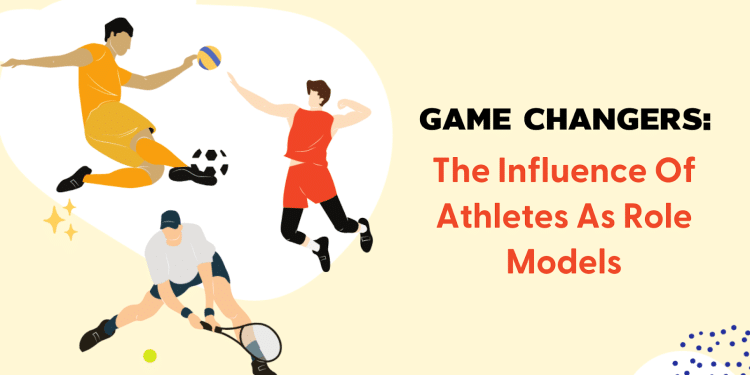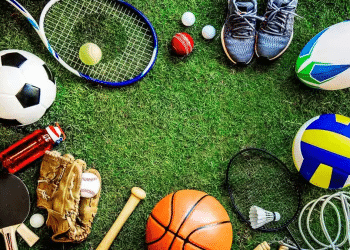Discover the incredible influence of athletes as role models! From their winning mindset to acts of kindness. Explore how these icons motivate, lead, and make a difference. Let’s unveil the impact that makes them more than just athletes.
Have you ever looked up to someone you admire, like a superhero or a kind teacher? Athletes are a lot like that. They’re super good at sports and great at being athlete role models.
They demonstrate resilience, teamwork, and strength, setting examples both in and out of the sports arena. Their display of skill isn’t confined to scoring goals or making leaps; it’s about imparting the belief that dedication and perseverance can turn our dreams into reality.
But being an athlete role model is about more than just winning games. Athletes also teach us about teamwork, fairness, and being kind to others. They use their fame to help charities, visit hospitals, and spread happiness. They’re like real-life heroes, not just because they can hit a ball far or run fast. But because they show us how to be strong, kind, and brave.
Today, we’ll explore how these amazing athletes, as role models, can teach us important things.
Athletes as role models
Athletes as role models are like the superheroes we see in movies, but they’re real and teach us valuable life lessons. They’re not only great at sports, like kicking soccer balls, running fast, or hitting home runs, but they also inspire us in many other ways.
Take Simone Biles, a gymnast who performs flips and jumps that seem magical. She shows us the importance of asking for help when we need it and taking care of our mental health. Cristiano Ronaldo, another fantastic athlete, excels at soccer and is also generous, donating money to help sick children.
Athlete role models teach us that winning isn’t everything. It’s about working hard and not giving up. Whether learning to ride a bike or solving a tricky puzzle, they show us the value of dedication and perseverance.
Sometimes, athlete role models make mistakes, but they teach us it’s okay as long as we learn from them. They remind us about fairness, kindness, and being a good team player, just like what we learn in school.
Athletes use their fame to help others by visiting hospitals and providing food to those in need. They demonstrate that being a hero isn’t just about winning games—it’s also about making the world a better place by helping people.
Athlete role models aren’t just exceptional in sports. They guide us about sports and how to be kind, courageous, and work hard to chase our dreams!
What percentage of children aspire to be professional athletes?
It’s super exciting to watch our favorite athletes play and win. However, not every kid wishes to grow up and become an athlete role model. Only a few kids dream of becoming pro athletes. Sometimes, many kids are interested in being athletes because they see them a lot on TV, in games, and on posters. But did you know most kids have different dreams too?
Studies indicate that approximately 20% to 30% of kids aspire to be athlete role models. So, among 100 friends, roughly 20 to 30 might express their desire to become athletes. However, compared to the various incredible aspirations kids have, this isn’t a large number. Children aspire to become doctors, teachers, firefighters, scientists, astronauts, and superheroes!
Kids have diverse dreams because everyone is unique and fascinated by different things.
Some kids might love playing sports and dream of becoming famous athletes. They might practice a lot and work hard to achieve their dreams, and that’s awesome! But many other kids have different passions and dreams too. Some might love drawing, writing stories, playing music, or exploring outer space!
As kids grow up, their dreams often change a lot. As they discover more about themselves, they uncover new things that they truly enjoy and find interesting. They might try different activities, learn about various jobs, or meet inspiring people. This makes them think differently about their future. And that’s completely okay!
While it’s awesome to dream of becoming an athlete role model, not everyone wishes for that. It is important to understand that everyone’s dreams are unique. Whether it’s about sports, art, science, or anything else. What truly counts is pursuing what brings us joy and excitement about what lies ahead in our future.
Why are athletes good role models?

Athletes can be fantastic role models for many reasons. These include:
- Hard work and dedication
- Strength and perseverance
- Teamwork and cooperation
- Kindness and giving back
- Encouraging health and fitness
- Learning from mistakes
Hard work and dedication
Athletes are like superheroes in training. They spend a lot of time practicing their sports, just like how we practice learning new things at school. They put in a lot of effort to improve their skill. Athletes as role models show us that it’s not just about being naturally talented. Working hard and not giving up makes all the difference. Anyone can tell they have put lots of effort as they score a goal or pull off a fantastic jump.
Strength and perseverance
Athletes face many challenges. Most time, things don’t go as planned. However, strength isn’t only about physical muscles. It’s about being resilient and having a strong spirit! They don’t let mistakes or difficult times stop them from moving forward. Instead, they keep pushing and give their best. This shows us that even when we meet tough times, we can move ahead with determination and bravery.
Teamwork and cooperation
Athlete as role models often play as part of a team. They show us that teamwork is super important. Just like in a game of tag or when we do group projects at school, athletes work together with their teammates. They support each other, share ideas, and celebrate victories together. This teaches us how awesome it is to cooperate and help each other succeed.
Kindness and giving back
The reason why are athletes good role models use their fame and success to assist others. Athletes go to hospitals, contribute funds to charities, and endorse initiatives aiding those in need. These generous acts demonstrate that fame involves more than just recognition; it’s about creating a beneficial influence in the world. Athletes motivate us to show kindness and assist others, regardless of the scale of our actions.
Encouraging health and fitness
Athletes as role models inspire us to stay healthy and active. When we watch them play, they make us want to get up and move, too! They show us that being active can be fun. Whether it’s shooting hoops, swimming, or kicking a ball around, they teach us that staying fit is not just important; it’s enjoyable too!
Learning from mistakes
Athlete as role models aren’t flawless. At times, they make mistakes or don’t come out on top in every game. However, they teach us that making mistakes is alright; it’s part of learning and improving! Athletes demonstrate that when things don’t work out, staying positive, learning from the experience, and giving it another shot are crucial. They also emphasize that fairness, respect, and being gracious, regardless of winning or losing, are the real keys in sports and in life. That’s why athletes are good role models.
By demonstrating these qualities and sharing important lessons, athletes as role models teach us valuable things that we can apply both in sports and in our everyday lives!
How can athletes be role models?

Athletes aren’t solely exceptional in sports; they are also remarkable role models! They demonstrate how dedication, compassion, collaboration, and persistence can create a significant impact.
- Leading by example
- Inspiring through actions
- Teaching valuable lessons
- Encouraging health and fitness
- Being role models on and off the field
- Using fame for good
Leading by example
Athletes as role models lead by example. They exert tremendous effort to excel in their sports. Observing their matches or competitions showcases the immense dedication and practice they invest. This lesson resonates beyond sports: to improve in endeavors such as drawing, musical instruments, or acquiring new skills, we must similarly practice diligently. Athletes emphasize that commitment and perseverance are vital in attaining our objectives.
Inspiring through actions
Many athlete role models use their fame and success to help others. They visit hospitals to meet sick kids, donate money to charities, or support causes that help communities. By doing these kind acts, they show us the importance of giving back and being caring towards others. They use their popularity not just for themselves but to make the world a better place for everyone.
Teaching valuable lessons
Athlete as role models teach us about teamwork.
In sports, they collaborate as a team to secure victories. They illustrate the significance of unity and mutual support, emphasizing the importance of working collectively and standing by one another. Just like when we play games with friends or do group activities at school, athletes demonstrate how everyone’s effort contributes to success. They also teach us about fair play, respecting opponents, and playing by the rules.
Encouraging health and fitness
Athletes role models inspire us to stay healthy and active. When we see them running, jumping, or playing sports, it encourages us to get moving too! They demonstrate that engaging in physical activity can be both fun and pleasurable. Whether it involves playing tag, riding a bike, or dancing, athletes serve as a reminder that staying active isn’t merely beneficial for our physical health but also contributes positively to our mental well-being.
Being role models on and off the field
Athletes show us the importance of being good in sports, win or lose. They teach us that even if things don’t go as planned, staying respectful and positive is essential. Athlete role models demonstrate that learning from mistakes and trying again is an integral part of growing and getting better. They encourage us to be fair and kind and show good sportsmanship in everything we do.
Using fame for good
Athletes as role models are an example of using fame for good causes. They establish themselves as role models through their benevolent actions, inspiring others to follow suit. They motivate us to utilize our own skills and abilities to aid others and create a beneficial influence within our communities. Athletes demonstrate that irrespective of fame or recognition, anyone can make a meaningful difference by exhibiting kindness and offering assistance.
Inspiring dreams and ambitions
Are athletes good role models? Yes, because inspire us to dream bigWhen we witness athletes accomplishing their goals with immense dedication and perseverance, it inspires us to pursue our own dreams. They demonstrate that with unwavering commitment and hard work, we have the ability to strive for our ambitions and turn them into reality.
Athletes impart crucial life lessons about the value of hard work, kindness, teamwork, perseverance, and contributing to others. They stand as exemplary role models, not only in sports but also in guiding us to become better individuals in our own lives.
What do athlete role models teach us?
A more detailed explanation of the lessons that athletes, as role models, teach us:
- Hard work and dedication
- Perseverance and resilience
- Teamwork and cooperation
- Are athletes good role models of kindness?
- Healthy living and fitness
- Are athletes good role models in learning from mistakes?
- Sportsmanship and fair play
- Inspiring dreams and ambitions
Hard work and dedication
Athletes as role models show us that achieving success takes a lot of hard work and dedication. They practice their sport for hours daily, improving their skills bit by bit. This teaches us that when we’re passionate about something, putting in effort and dedication can help us get better at it too. It inspires us to work hard towards our goals whether it’s learning a new skill, doing well in school, or pursuing our interests.
Perseverance and resilience
Athletes encounter challenges and setbacks in their careers, mirroring the difficulties we experience in our lives. However, they don’t allow these obstacles to halt their progress. Instead, they persist and keep moving forward, demonstrating that during tough times, maintaining resilience and perseverance is crucial. They impart the lesson that setbacks are a natural part of the journey and that facing challenges contributes to our personal growth, making us stronger in the process.
Teamwork and cooperation
In team sports, athlete role models work together towards a common goal – winning the game. They demonstrate how cooperation and teamwork are vital for success. Through actions like passing the ball, mutual support, and effective communication on the field, athletes impart the significance of collaboration and encouragement. They motivate us to be reliable team players in our own lives, whether it’s within our families, at school, or during activities with friends.
Are athletes good role models of kindness?
Many athletes use their fame and success to help others. They visit hospitals, support charities, or set up foundations to aid causes they believe in. This highlights the importance of kindness and contributing to our communities. Athletes demonstrate that even small acts of kindness can have a profound impact on someone’s life. They inspire us to show compassion and assist those who require support, ultimately working towards creating a more positive world for everyone.
Healthy living and fitness
Athletes motivate us to maintain an active lifestyle and prioritize our physical well-being. They demonstrate that staying fit and healthy goes beyond sports; it’s about feeling physically and mentally well. Athletes encourage us to engage in activities we find enjoyable and to remain active, whether through sports, dancing, or taking a leisurely walk. Their emphasis on a healthy lifestyle underscores its significance in enhancing our overall well-being.
Are athletes good role models in learning from mistakes?
Athletes teach us that errors are a natural and essential part of learning. In games, they might miss shots or make errors, but they don’t allow these setbacks to demoralize them. Instead, they learn from these mistakes and focus on enhancing their performance. This illustrates that it’s acceptable to make mistakes as long as we gain insights from them, considering them as chances to develop and get better.
Sportsmanship and fair play
Athletes as role models display good sportsmanship whether they win or lose. They congratulate opponents, shake hands, and show respect. This teaches us about fair play, respect for others, and playing by the rules. Athletes remind us that winning isn’t everything; how we play the game matters too.
Inspiring dreams and ambitions
Athletes role models inspire us to dream big! Observing athletes attain their goals through persistent effort and unwavering determination inspires us to chase our own dreams. They demonstrate that by dedicating ourselves and putting in the necessary effort, we too can strive for and achieve our aspirations. Athletes serve as examples that our dreams are achievable with perseverance and passion.
Athletes as role models teach us these vital life lessons, guiding us in sports and becoming better individuals in our lives!
Do professional athletes have an obligation to be positive role models?
Here’s why people believe that professional athletes have a responsibility to be positive role models:
- Influence on society
- Impact on communities
- Responsibility to fans and supporters
- Contractual and ethical expectations
- Impact on team and sport
Influence on society
Professional athletes are prominent figures in society, often looked up to by people, especially young fans, who admire their skills and achievements. These athletes serve as influential role models whose conduct and actions hold significant sway over the beliefs and behaviors of their supporters.
When athletes display commendable qualities such as dedication, resilience, fair play, and compassion, they motivate others to adopt these attributes. Through exhibiting positive behavior both during competitions and in their personal lives, athletes have the potential to bring about a positive transformation in the lives of numerous individuals, molding their principles and outlooks.
Impact on communities
Are athletes good role models because of their widespread recognition? They have a special capability to shine a spotlight on significant societal concerns and actively participate in community endeavors.
Their influence allows them to champion positive transformations, endorse charitable projects, and amplify awareness regarding crucial topics like education, health, equality, and environmental preservation. Athletes who participate in philanthropy or volunteer activities play a role in aiding communities and inspiring others to join in and create an impact.
Responsibility to fans and supporters
Professional athletes have dedicated fans who deeply admire and look up to them. Children, in particular, idolize athletes and often aspire to be like them. Therefore, athletes are responsible for being positive role models for their fans.
Their actions, attitudes, and behaviors can significantly influence the behaviors and beliefs of their followers. By demonstrating respect, integrity, discipline, and humility, athletes can instill positive values in their fans, encouraging them to follow similar principles.
Contractual and ethical expectations
Athletes as role models and representatives of their teams, leagues, and sponsors, often have contractual obligations and ethical expectations. They may be required to adhere to certain codes of conduct. It emphasizes responsible behavior on and off the field of athletes as role models.
They maintain a positive public image. The idea it to uphold ethical standards crucial to their professional responsibilities. These expectations may include refraining from actions that could damage their reputation or the reputation of their team or league.
Impact on team and sport
Athletes role models are representatives of their teams and the sports they play. Their behavior can influence the reputation and perception of their team. Also, of the sport as a whole. Positive role models enhance the image of their team and sport, attracting more support from fans and sponsors. Conversely, hostile behavior or controversies can tarnish the team’s reputation and impact the sport’s perception.
While not all athletes may feel obliged, many recognize the influence they wield and voluntarily choose to act as positive role models. Their commitment to positively influence society extends beyond their athletic achievements, contributing to improving their communities and inspiring others to make a positive impact in the world.
Why do we idolize sports players?

The reason why do we idolize sports players are several:
- Exceptional skills and talents
- Entertainment and excitement
- Inspiring achievements
- Role models and influence
- Emotional connections and loyalty
- Media and popularity
- Escapism and entertainment culture
- Social and economic impact
Exceptional skills and talents
Sports players capture our admiration because of their exceptional abilities and talents. Their mastery of the game, whether it’s their precise shots, amazing catches, or flawless moves, leaves us in awe. Their skillful performances showcase years of hard work, dedication, and practice, which amazes and captivates us.
Entertainment and excitement
Sports players entertain us by bringing excitement and thrill to the games. Their athleticism, competitive spirit, and impressive performances keep us engaged and on the edge of our seats. Whether it’s the speed, agility, or sheer intensity of their play, sports players make the games more exhilarating and enjoyable for fans worldwide.
Inspiring achievements
The achievements of sports players are a source of inspiration for many. Their victories, championships, record-breaking performances, and ability to overcome challenges motivate and encourage us. Their relentless pursuit of excellence demonstrates the rewards of determination, hard work, and perseverance, inspiring us to strive for our own goals.
Role models and influence
Many sports players are seen as role models, displaying qualities like resilience, teamwork, sportsmanship, and determination. Their actions both on and off the field inspire us to adopt these positive traits in our lives. For younger fans, these athletes serve as heroes and role models, influencing their aspirations and values.
Emotional connections and loyalty
Fans often develop emotional connections and deep loyalty to sports players, especially when they represent beloved teams or countries. Players become symbols of pride and unity for their fans, fostering a strong sense of community and belonging among supporters.
Media and popularity
Extensive media coverage spotlights the stories, achievements, and personal lives of sports players. This widespread visibility through various media platforms increases their popularity and makes them highly recognizable figures in society. Their actions and achievements become part of popular conversations and cultural discussions.
Escapism and entertainment culture
Beyond their athletic abilities, sports players become cultural icons. They embody values, styles, and personalities that resonate with fans, offering an escape from daily routines. They provide a shared interest that brings people together, transcending boundaries and fostering a sense of camaraderie among fans.
Social and economic impact
The influence of sports players extends beyond the playing field, impacting industries such as fashion, advertising, and endorsements. Their endorsements and sponsorships contribute to their visibility and make them influential figures in popular culture. Their impact goes beyond sports, shaping societal trends and consumer behaviors.
In summary, sports players are admired and idolized for their remarkable skills, entertaining performances, inspiring achievements, role model qualities, emotional connections, media presence, cultural impact, and broad societal influence. Their contributions to sports and society make them highly respected and influential individuals.
Conclusion
While not all children aspire to become professional athletes, athletes as role models represent more than sports achievements. They leverage their platform to create a positive influence, backing charitable causes, making visits to hospitals, and motivating others to exhibit kindness and generosity. Athlete role models showcase that being a role model entails more than mere victories in games; it’s about effecting change in the world and motivating others to pursue their ambitions, regardless of their chosen paths.
Athletes as role models, hold a crucial position in shaping morals, impacting conduct, and encouraging individuals to strive for distinction, compassion, and constructive contributions to society. Their influence extends beyond the realm of sports, earning them admiration not just for their athletic talents but also for their outstanding qualities and deeds.
- “As chicaadmin at The Chicago Weekly, I curate trending national and international news stories with a focus on social justice and cultural impact. My passion for journalism and commitment to independent media are fueled by my Chicago roots and belief in the power of storytelling to connect communities. Follow me on Twitter for insightful commentary and news updates!”















